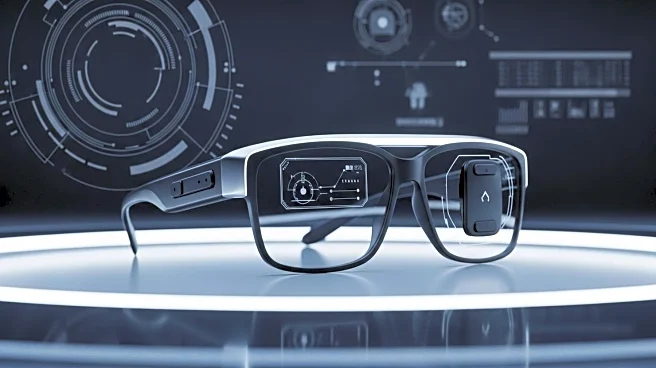What's Happening?
Meta has introduced its latest Ray-Ban smart glasses, featuring a built-in display and a wristband controller for hand gesture control. These glasses integrate Meta apps such as Instagram, WhatsApp, and Facebook, offering functionalities like live translations and navigation directions. The display acts as a heads-up display for notifications, navigation, and multimedia content. The glasses are equipped with a Meta Neural Band, a wristband that reads electrical signals in the hand to register gestures as inputs. This technology allows users to interact with the glasses through pinches, swipes, and wrist turns. The glasses are designed to be lightweight and comfortable, despite being thicker than previous models.
Why It's Important?
The introduction of smart glasses with integrated displays and gesture control marks a significant advancement in wearable technology. This development could potentially shift the way users interact with digital content, moving away from traditional smartphones to more immersive and hands-free experiences. The integration of Meta apps and features like live translation and navigation could enhance accessibility and convenience for users. The gesture control technology represents a breakthrough in user interface design, offering a more intuitive and seamless interaction with digital devices. This innovation positions Meta as a frontrunner in the smart glasses market, potentially influencing future developments in wearable tech.
What's Next?
Meta plans to launch additional features for the smart glasses, including handwriting recognition. The company is also focusing on improving the fluidity of gesture inputs and expanding the applications of the technology. As the smart glasses market evolves, other tech companies may introduce competing products, potentially leading to further innovations and enhancements in wearable technology. Meta's continued investment in smart glasses technology suggests a long-term strategy to establish these devices as a major computing platform.
Beyond the Headlines
The development of smart glasses with gesture control raises ethical and privacy concerns, particularly regarding the collection and use of biometric data. The ability to capture and overlay video content with workout stats introduces new possibilities for fitness tracking and personal data management. As wearable technology becomes more integrated into daily life, discussions around data security and user consent are likely to intensify.










